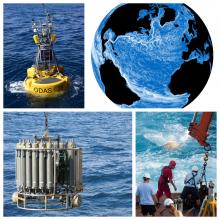CLASS will deliver the knowledge and understanding of the Atlantic Ocean system that society needs to make evidence-based decisions regarding ocean management. We aim to address key knowledge gaps in our understanding of ocean variability, climate regulation and ocean services, and to assess how the ocean will evolve as a result of climate change and intensified human exploitation.
 This will be delivered through Marine National Capability underpinning activities.
This will be delivered through Marine National Capability underpinning activities.
The ocean is vital to the functioning of our planet. It regulates climate by taking up 93% of the Earth’s excess solar heat and provides the primary protein source for over a billion people. The ocean modulates key biogeochemical cycles by taking up ~30% of anthropogenic carbon. The ocean redistributes heat in the Earth system via a surface to seabed overturning circulation driven by exchanges of momentum, heat and fresh-water with the atmosphere, and this sets and regulates global climate patterns. The Atlantic Ocean is central to driving and regulating the overturning circulation because half of the global formation of deep waters occurs here. The circulation of the North Atlantic makes it a hotspot of carbon uptake, storing 23% of anthropogenic carbon even though it comprises only 15% of the global ocean surface area.
The inherent variability of Atlantic circulation is high and, as such, the detection of anthropogenically driven change takes decades to emerge. As we deploy new technologies to observe these dynamic processes, the impacts of human activities are becoming increasingly obvious and of growing concern.
It is now clear that the ocean plays a pivotal role in climate change and this is having profound consequences for both regional weather patterns and marine ecosystems. However, assessment of potential socioeconomic impacts and the knowledge base to maintain resilient natural resources requires an integrated coordinated effort and detailed understanding of the natural variability of the basin decadal scale ocean system. CLASS will therefore apply a synergistic approach, combining a range of internationally coordinated observations and world-class numerical models to allow whole system exploration, hypothesis development and perturbation experiments that are not available from observations alone.
Moreover, these models will provide the capability for future forecasting and scenario testing, which are vital for investigating the relationship between the ocean and wider earthand human-systems, with respect to climate change and direct anthropogenic marine impacts. As well as fulfilling the UK contribution to international observing and modelling programmes, our underpinning activities will prioritise the use of autonomous vehicles and new sensors to improve efficiency, and increase the spatial and temporal coverage of the ocean.
Our underpinning activities will also support existing NERC NC-funded multi-system long term science programmes, strategic research, training activities and discovery grants, provide a platform for future funding investments for the academic community, and contribute key datasets and model outputs that can be used to address important marine policy relevant questions both within the UK and internationally.